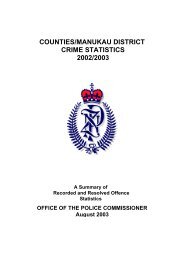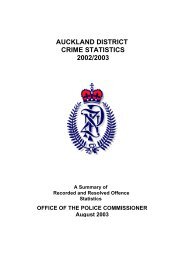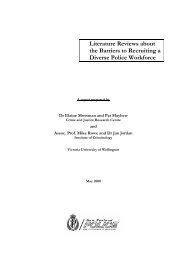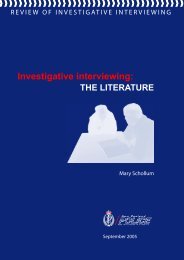Electronic Crime Strategy to 2010 - New Zealand Police
Electronic Crime Strategy to 2010 - New Zealand Police
Electronic Crime Strategy to 2010 - New Zealand Police
Create successful ePaper yourself
Turn your PDF publications into a flip-book with our unique Google optimized e-Paper software.
Dunedin-based ECL staff have<br />
been operating preview clinics<br />
for one week of each month, in<br />
Christchurch.<br />
The clinic provides an<br />
opportunity <strong>to</strong> preview seized<br />
electronic equipment and identify<br />
any obvious evidence.<br />
Many of the cases previewed<br />
at the clinic might otherwise not<br />
have been submitted <strong>to</strong> the ECL.<br />
In one clinic alone, of the<br />
36 items previewed:<br />
• 5 contained evidence of<br />
child abuse or objectionable<br />
material<br />
• 10 provided leads <strong>to</strong> aid in<br />
associated investigations<br />
• 3 contained evidence of<br />
money laundering or fraud<br />
• 8 items identified suspects in<br />
receiving or burglary cases<br />
• 1 contained evidence relating<br />
<strong>to</strong> a drugs investigation<br />
• 1 was submitted for further<br />
specialist analysis and<br />
recovery at the ECL<br />
When the ECL was first established, specialist skills and equipment were needed<br />
<strong>to</strong> perform Level 1 analysis, requiring that all jobs relating <strong>to</strong> electronic evidence be<br />
submitted <strong>to</strong> the ECL for full analysis and evidence recovery.<br />
Technology has since moved on, and more <strong>to</strong>ols are now available, making it easier<br />
for non-specialist staff <strong>to</strong> perform Level 1 analysis (with assistance from the ECL).<br />
This development has yet <strong>to</strong> be reflected in the workload of the ECLs with most jobs<br />
still submitted for full analysis.<br />
The proposed development of additional <strong>to</strong>ols will simplify some Level 2 analysis<br />
enabling more identification of evidence by staff outside the ECL, and reduction in<br />
the overall ECL workload.<br />
Improving Frontline Capability<br />
The high ECL workload is resulting in delays in processing electronic items, which<br />
can compromise investigative outcomes. Moving Level 1 activities from the specialist<br />
ECL <strong>to</strong> frontline staff (supported by the ECL) will enable a faster turnaround time and<br />
reduce the ECL workload.<br />
Preview clinics take the ECL specialist capability out <strong>to</strong> each District on a<br />
regular basis, with ECL staff working alongside investiga<strong>to</strong>rs <strong>to</strong> securely (without<br />
endangering the exhibit or potential evidence) view the contents of seized computers<br />
or disks and identify items of interest. Such Level 1 type analysis will often identify<br />
all that is needed for the investigation, although subsequent Level 2 type analysis<br />
can be initiated if required. This approach enables a focussed investigation of<br />
disk contents, and avoids specialist effort on misdirected analysis and<br />
unneccessary reporting.<br />
Preview clinics are already held each month in Christchurch, and although the<br />
number of items previewed each month may vary, there is a consistently high<br />
success rate (refer sidebar).<br />
<strong>Police</strong> will extend the use of preview clinics <strong>to</strong> each District.<br />
Recovery of evidence from mobile phones is another growth area for the ECL.<br />
The extraction of pho<strong>to</strong>s or other information contained on a mobile phone in an<br />
evidentially safe manner requires some specialist <strong>to</strong>ols that can be made available <strong>to</strong><br />
frontline staff.<br />
Mobile phone booths have already been established in some Districts enabling local<br />
staff <strong>to</strong> obtain information (eg, pho<strong>to</strong>s, messages, contacts, or complete SIM dump)<br />
directly from seized mobile phones, without intervention from ECL staff.<br />
<strong>Police</strong> will implement mobile phone booths in each District with appropriate support<br />
and guidance for District staff.<br />
District Liaison<br />
Improved communications <strong>to</strong> frontline staff will aid their understanding of e-crime,<br />
electronic evidence, and the services available through the ECL. Introduction of the<br />
above initiatives will also require assistance from Districts <strong>to</strong> provide local liaison<br />
points, contacts for scheduling preview sessions, and <strong>to</strong> generally act as a local<br />
champion for the ECL.<br />
E-<strong>Crime</strong> Liaison Officers are proposed for each District – either as a dedicated staff<br />
member or in conjunction with other duties (depending on each District’s size and<br />
requirements).<br />
<strong>Police</strong> will appoint E-<strong>Crime</strong> Liaison Officers for each District <strong>to</strong> facilitate local ECL<br />
activities and communications.<br />
Research<br />
<strong>Police</strong> wish <strong>to</strong> build an accurate picture of e-crime offending and continue <strong>to</strong><br />
encourage all victims <strong>to</strong> report offences. We need this picture because crime<br />
reduction relies on understanding the criminal environment as a critical first step in<br />
effective problem solving. The intelligence picture will be used <strong>to</strong> influence public and<br />
private sec<strong>to</strong>r organisations and individuals who can impact on electronic security.<br />
<strong>Police</strong> will encourage the sponsorship of research <strong>to</strong> clarify the extent, scope, and<br />
impact of e-crime in the <strong>New</strong> <strong>Zealand</strong> setting.<br />
<strong>Police</strong> will collect and analyse e-crime data, providing intelligence and direction <strong>to</strong><br />
investigations, and strategies <strong>to</strong> address e-crime.<br />
An E-<strong>Crime</strong> Liaison Officer in<br />
each District can:<br />
• liaise with the ECL over case<br />
submissions and priorities<br />
• assist investiga<strong>to</strong>rs in using<br />
provided <strong>to</strong>ols <strong>to</strong> identify<br />
evidence<br />
• assist ECL staff in scheduling<br />
preview clinics and sessions<br />
• prepare exhibits for preview<br />
sessions<br />
• provide guidance for District<br />
staff in seizing electronic<br />
exhibits<br />
• provide onsite support<br />
for mobile phone booths,<br />
assisting staff and maintaining<br />
equipment<br />
• coordinate the<br />
introduction of ECL initiatives<br />
(eg Project EVE)<br />
12 E-CRIME STRATEGY TO <strong>2010</strong> E-CRIME STRATEGY TO <strong>2010</strong> 13
















